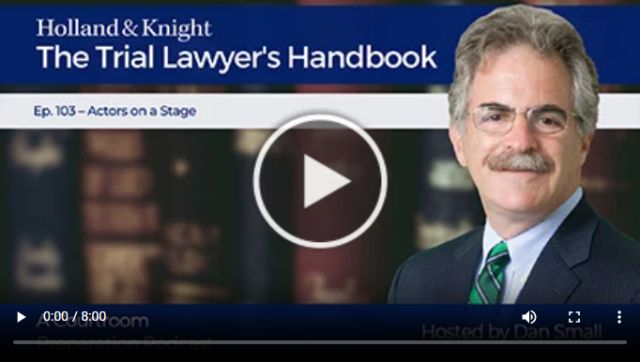- in United States
In this episode of "The Trial Lawyer's Handbook" podcast series, litigation attorney Dan Small reflects on the dangerous yet invaluable role of an undercover agent, exemplified by the Cammarata Racketeer Influenced and Corrupt Organizations Act (RICO) case. The Cammarata Organization, like many organized criminal groups, was highly secretive, and building evidence for trial would be challenging without insider testimony. Working alongside the Texas Rangers, Mr. Small befriended skilled undercover agents and learned their strategies for creating a false persona. The episode offers a glimpse into infiltrating a criminal organization, as well as amusing anecdotes from Mr. Small's first attempt at going undercover at a local honky-tonk.
Listen to more episodes of The Trial Lawyer's Handbook here.
Mr. Small is also the author of the American Bar Association (ABA) book Lessons Learned from a Life on Trial: Landmark Cases from a Veteran Litigator and What They Can Teach Trial Lawyers.
Podcast Transcript
Dan Small: On some level, all trial lawyers are actors — some of us more frustrated than others. Our stage is the courtroom, our stories are our cases, our script is that strange language of question and answer, and our audience is, of course, the jury. But one way for law enforcement to infiltrate a secret criminal organization is using an undercover agent, and when, as a trial lawyer, we try cases involving undercover agents, we realize that our performance is so much more controlled, so much easier, and so very much safer.
We teach trial lawyers to "be yourself," but an undercover agent has to create a persona that's a strange combination of himself or herself and someone else. Then they have to use that persona to win the trust of suspicious and sometimes dangerous strangers. Extraordinary. As a prosecutor for the Department of Justice's Organized Crime Strike Force in the drugs and multiple-murder RICO investigation of the Cammarata Organization we've been discussing in prior episodes, I had the privilege of working with the best I've ever seen.
Benny, as we'll call him, was a Texas Ranger, an experienced investigator and an undercover agent. He grew up on a ranch in West Texas and his cover was usually a wealthy West Texas rancher. He was bright and personable, but it was more than that. If you walked into a bar full of strangers with Benny, somehow, within an hour or so, half the bar were your friends. You couldn't explain how it happened, but you know that it doesn't happen when you walk into a bar without Benny.
True story: One night before the RICO trial of the Cammarata Organization, I was working late preparing, so I agreed to swing by a local bar when I was done and meet a group of the Rangers from the case team for drinks, including Benny. Apparently, before I arrived at the bar, they had befriended two guys who set off their collective "Spidey Sense," if you will. Something didn't seem right about these two. Drug dealers? Maybe, but they needed to know more. So they sat with the two men, drinking, playing liar's poker and gently probing. All without mentioning that they were all Texas Rangers.
A couple hours later, I walked into the bar. Well, I don't look or sound like a West Texas rancher, but Benny had anticipated the problem. He had already set the stage by mentioning to these two guys that he was doing a land deal and waiting to meet with his lawyer, who, for some reason I can't recall, had come down from up North to help put the deal together.
So when I walked over, Benny grabbed my arm, just a little too hard, and pulled me, not gently, down into a chair saying, "Dan, how's that land deal coming? You know, I forgot to mention —" and on he went with some story he'd fabricated about the fabricated land deal, just to give me time to understand and adjust. All part of the show. So we played cards and drank some more. Eventually, the Rangers' unspoken collective wisdom decided that these two guys were actually OK, and imagine their surprise when someone casually let it drop that the fellows they'd been hanging out with all evening were all Texas Rangers, except for that one lawyer from up North.
Another true story: Throughout the RICO trial, we had a team of eight to 12 Rangers gathered in Austin from all around the state. They're great folks, but they also love to party. No matter how hard I worked them, both before the trial and during the trial, they'd want to go out drinking and dancing every night — and they always invited me along.
I couldn't do it. I explained that I was working too hard to get ready for trial. And I needed all my energy for that. The compromise we worked out was Wednesdays. Wednesday was Nickel Beer Night at the Silver Dollar, as I recall, where we would be until 1 a.m. closing time. It was there I discovered a cultural difference: As Texans, they would meet someone and spend the night drinking, dancing and talking, without anyone mentioning what they did for work. It just wasn't important. But I was from the Northeast, where "So what do you do for work?" is usually one of the first questions when you meet someone. The Rangers realized, correctly of course, that at a country western honky-tonk outside of Austin, Texas, "I'm a prosecutor with the Organized Crime and Racketeering Strike Force of the U.S. Department of Justice in Washington," just wasn't going to work.
So one night, sitting at a bar, I learned from this group of experts all about developing an undercover persona. Relentlessly, they asked me about myself: my background, jobs I'd held, family, where I'd lived, et cetera. They explained that a good undercover persona was not a complete invention. It should be based as much as possible on real life and real experiences. I had to appear comfortable with it, able to talk about it, tell jokes and stories, but without being self-conscious or nervous. It had to be as real as possible and yet not so special that someone might follow up on it.
Finally, after much discussion and some debate, they came to an agreement. One of my summer jobs in college had been as a mailman for the U.S. Post Office. That would work. It was interesting, occasionally funny, but not threatening or intimidating. And they could make it fit. I was mailman from up North, in town for a mailman convention.
And it did work, sort of. I used my new "cover" a couple times at the Silver Dollar, and it certainly was much more sociable than the whole DOJ thing. But far more valuable to me was the hands-on lesson on the methods and challenges of undercover work from a team of experts.
Infiltrating the Cammarata Organization took all those same skills, but with so much more at risk. Despite the danger, Benny was able to get an introduction to one of the members and then slowly, patiently, work his way in. A big milestone was when he was invited to one of Mama Cammarata's Sunday dinners at Sam's house: endless delicious homemade Italian food, lively conversation and a room full of criminals and murderers. Slowly, Benny became accepted as one of them.
Ultimately, Benny was able to gather important information about the organization's activities and served as a key witness at trial. Meanwhile, once the investigation and his role came out, the relationships that he developed with several members of the group allowed him to help us persuade them to turn, plead guilty and provide testimony for the government. So undercover work played several key roles in the case. Actors on a stage.
The content of this article is intended to provide a general guide to the subject matter. Specialist advice should be sought about your specific circumstances.


